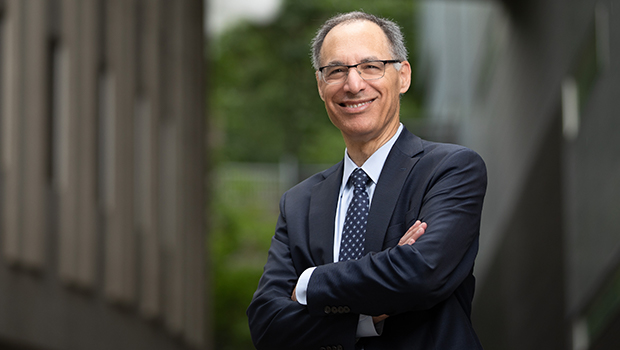
The Faculty of Medicine stopped being simply a medical school a long time ago. Now it has a new name to reflect that: meet the Faculty of Medicine and Health Sciences.
The name change was approved in April by McGill’s Board of Governors, along with the creation of two new Schools within the Faculty, just as the global pandemic hit. More pressing concerns – namely the immediate priorities of the pandemic and systemic racism – meant the name change wasn’t publicly announced until now. We spoke to V-P (Health Affairs) and Dean of Medicine and Health Sciences Dr. David Eidelman and other members of the Faculty about what the new name means to them.
Fundamentals first
“The truth is, when I started as Dean, people were already talking about changing the name of the Faculty,” recalls Dr. Eidelman, speaking via Zoom. “I was reluctant to do it at that time, because I felt there were a lot of fundamental issues that had to be addressed in the Faculty before we got on to things like the name.”
A massive consultation effort was launched and eventually became the strategic plan known as Project Renaissance. “We went through a number of iterations of planning and implementing different changes. And eventually, we decided that it was important that the structure of the Faculty better reflect who we really are,” explains Dr. Eidelman. “One aspect of that was looking at what elements of our research programs needed additional support to continue leading in their fields.”
Out of these reflections, we established a series of initiatives to address clinical and research areas that were due for an expanded role. “One of these was population and global health,” says Dr. Eidelman. “I asked Gilles Paradis, who was at that time the Chair of Epidemiology, Biostatistics and Occupational Health, to put together a task force to look into it. They came back and said we don’t just need an initiative, we need a School. And that led to the establishment of the School of Population & Global Health in 2016.”
Naturally, this raised the question: “What about the rest of the place?” says Dr. Eidelman. “It became clear the research-focused departments also had unique needs that were perhaps not being best served under the existing organizational structure. And it seemed to us there should be a School or at least an entity that regrouped those departments and that became the School of Biomedical Sciences, created in April.”
The logical next step was the creation of the School of Medicine to encompass the Faculty’s prestigious undergraduate and postgraduate medical education programs, as well as its Continuing Professional Development activities. This sixth School was also approved in April.
New structure, new name
With the two new Schools coming on board, the time was right to revisit the Faculty’s name.
It wasn’t hard to find excellent arguments. Dr. Eidelman points out that Nursing has been part of the Faculty for 100 years, Physical & Occupational Therapy for 77 years and Communication Sciences and Disorders for 57 years. “For years these were tacked on, and basically it was a medical school with a few Schools and Departments,” says Dr. Eidelman. “Now the name embraces their significant contributions over all these years.”
Another compelling reason for the reorganization is the changing face of health care research and delivery. The large datasets that increasingly drive research, as well as the evolving roles of health professionals in clinical settings, mean that increased interdisciplinarity and interprofessionalism are both essential, notes Dr. Eidelman.
“If it had just been a name change, and we hadn’t changed any of the structures, that’s just a brand shift,” he adds. “Here, the brand shift reflects a higher level of organization than we had before and a more sophisticated way of looking at our operations.”
Although there was some concern expressed about the name change because of the historic importance of Medicine as McGill’s first Faculty, the idea met with less resistance than the Dean expected when the community was polled last fall. “The majority – 81 per cent – thought it should be Faculty of Medicine and Health Sciences.”
How did Dr. Eidelman vote? “Faculty of Medicine and Health Sciences was my personal preference,” he says. “It was a real statement about who we are. It wasn’t pretending we weren’t what we had been for the last 200 years. I also thought ‘Faculty of Health Sciences’ would have been a bit of a missed opportunity because we were coming up on our Bicentennial. I thought that trying to find a balance between our past and our future was important, so that our alumni and the public-at-large would still recognize us.”
Welcome change
The response has been overwhelmingly positive from members of the Faculty.
For students in the Faculty, interprofessionalism is the future and they are delighted that the new name reflects that reality. “The renaming of the Faculty of Medicine and Health Sciences is an important milestone for students in health care professional programs,” says Ariane Lasry, fourth year medical student and External Communications Coordinator for the McGill Association of Students in Healthcare (MASH), which brings together student representatives from over 20 health-related disciplines and interprofessional student groups to promote interprofessional health care. “This recognition by the Faculty reaffirms what students in these programs already know: that health care is a team effort, the foundation of which is interprofessionalism. We are proud to be representing McGill’s evolving Faculty as it moves towards becoming a more inclusive representation of 21st century health care.”
Dr. Gilles Paradis, Strathcona Professor in the Department of Epidemiology, Biostatistics, and Occupational Health, sees in the new name a recognition of a shift in attitude about what health care is, and what – and who – it must focus on. “What’s in a name? A lot!” says Dr. Paradis. “Explicitly including ‘Health Sciences’ in the new name of the Faculty points to its firm commitment towards scholarship that is broad and engaging of all sectors of academia and society to promote health and wellbeing and disease prevention, to reduce inequities wherever they arise in the world, and to work relentlessly towards ‘Health for All’ in Canada and globally.”
Toward the future, with an eye on the past
Under its new title, the Faculty has many reasons to celebrate: Campus Outaouais, where medical students will train entirely in French, was successfully launched last month; the Ingram School of Nursing turned 100 in June; and in March 2021 McGill and the Faculty celebrate their Bicentennial. On the other hand, the global pandemic and systemic racism are urgent reminders that we need to do better and that we must continually challenge ourselves in our pursuit of excellence, notes Dr. Eidelman.
He points out that from the start, the Faculty’s researchers and clinicians have played a leading role in battling the pandemic, conducting COVID-19 research and working on the frontlines in our hospitals. He also notes that since the tragic killing of George Floyd, the Faculty has undertaken consultations and town halls informed by members of its Black community and its Social Accountability and Engagement Office, and will align its plan with that of the University, forthcoming at the end of this month.
Dr. Eidelman will finish up his second term as Dean next year and is optimistic about the renewed Faculty’s future, despite the current challenges. “We are a remarkably resilient organization – the kind of organization that, when something goes wrong, not only weathers it, but becomes stronger,” he says. “If I look over the last number of years, the number of challenges we faced – some of them internal, some of them external, some of them our fault, other ones nobody’s fault – consistently, we have risen to the occasion and come out of difficult situations stronger, better, more effective, more efficient, ahead of the game. I am confident we will come out of this extraordinary year stronger than when we went in. It doesn’t mean it’s going to be easy. It doesn’t mean things won’t go wrong. But I am confident that we’re going to come out stronger, because of the people who make up this Faculty.”
Here’s what The Faculty’s School Directors and Associate Deans have to say about the new name:
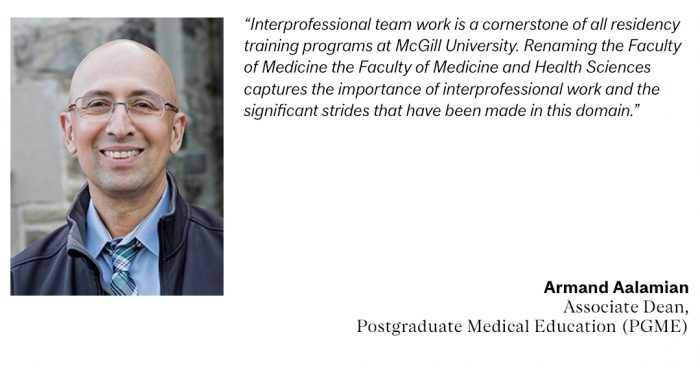
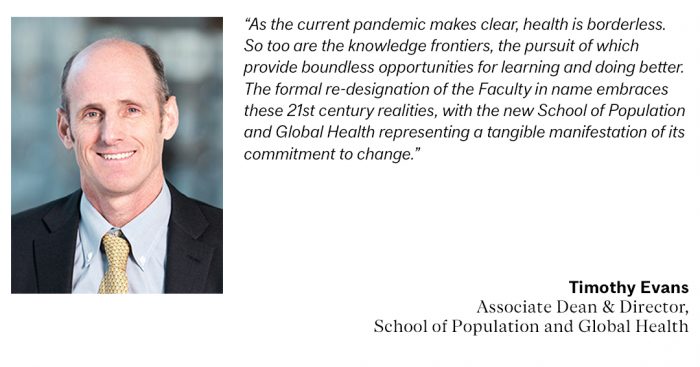
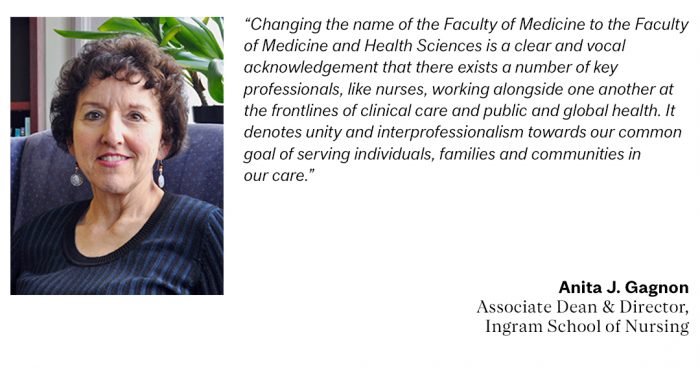
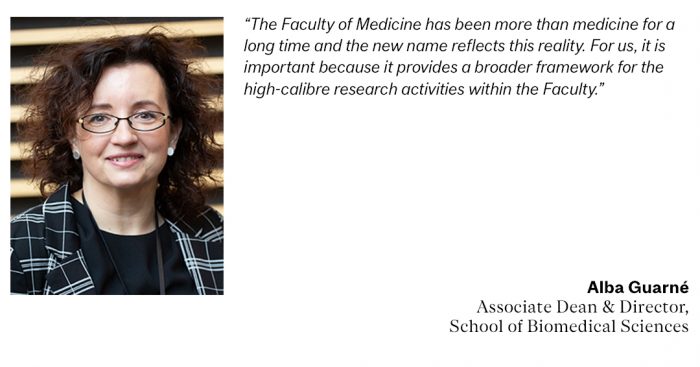
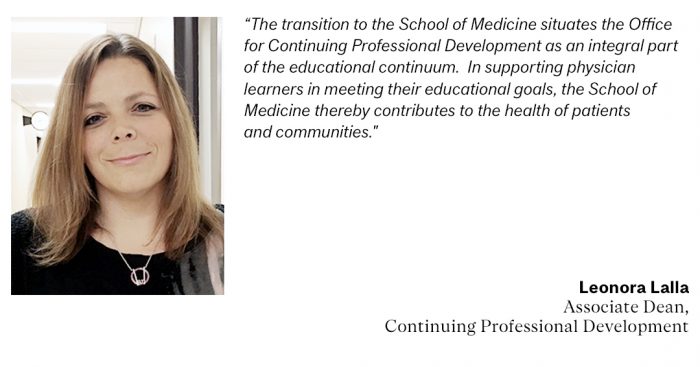

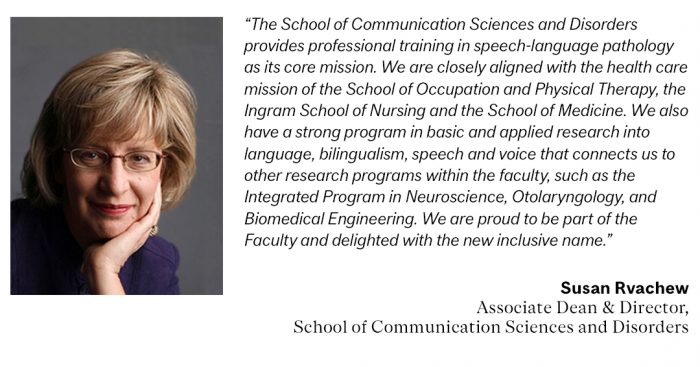
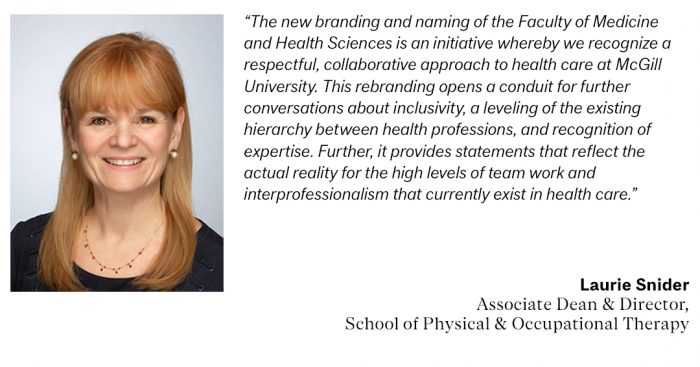

Congratulations on a major achievement. May it thrive for the next 200 years!